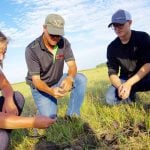SALMON ARM, B.C. – A proposal redefining bluetongue risk to Canadian livestock could become law this summer and end three decades of trade irritation with the United States.
The Canadian Food Inspection Agency released its bluetongue regulation document May 19, making it a notifiable rather than a reportable disease. It would also allow American cattle imports year round, without testing, to all regions of Canada.
The dispute dates back to the 1970s when Canada ruled that American livestock before importation must test free of the blood diseases bluetongue and anaplasmosis. Canada did not have to reciprocate with similar tests on export livestock.
Read Also

Lending policy still focused on primary producers: Farm Credit Canada
Farm Credit Canada said it has not changed its business practices and remains committed to supporting all producers, after a report from an Ottawa-based media outlet claimed otherwise.
“We know the bluetongue-anaplasmosis issue makes a lot of people angry and we think they are justified in being angry,” said Hugh Lynch-Staunton, president of the Canadian Cattlemen’s Association.
“That should get rid of a lot of the trade irritants we have with the Americans,” he said at the British Columbia Cattlemen’s Association meeting in Salmon Arm May 25.
The CCA has offered to set up a fund to cover any losses of sheep or other livestock but the group does not expect to have to spend any money because there has been no evidence of disease spreading among domestic sheep in Montana where bluetongue has been found.
Lynch-Staunton hopes this gesture encourages the U.S. to move on its BSE minimal risk rule to allow in Canadian cattle older than 30 months.
“They all agree they want to get it done. There is nobody saying why it shouldn’t be done, but it is taking a bloody long time and now we are getting into another set of elections and we are doing all we can,” said Lynch-Staunton.
The U.S. Department of Agriculture is waiting for the final CFIA report on its investigation into a BSE case found in B.C. so the information can be incorporated into its risk assessment. But it could be some time before trade resumes.
“I don’t think it is a good idea for you to hold your cows thinking that the market is going to improve in the next little while,” he said.
For feedlot operator Bill Freding of Oliver, B.C., movement on the bluetongue issue is good news but he is not holding his breath because a revised protocol is also needed for anaplasmosis. The CFIA promises that later this year.
“Until it happens, it was just like the border opening; you are a little skeptical,” he said.
While he has not imported U.S. feeders recently due to economic conditions, in the past, 60 percent of the feeders in his southern Okanagan feedlot came from Washington state. If economics are favourable, there will be U.S. cattle in Canadian lots this year.
“If the U.S. gets Rule 2 through, all these movements should be a whole lot easier. It is just as onerous to go down there,” he said.
In its proposal, the CFIA has agreed with the CCA that recent scientific developments show bluetongue is not a problem for Canadian livestock. The insect responsible for carrying the disease cannot survive the climate.
CFIA is considering anaplasmosis separately and is expected to release a consultation paper for comment this summer.
Ruminants can already be imported year round without testing from any state into Ontario, Quebec and the Atlantic provinces, so the restrictions are only relevant for Western Canada. Bluetongue restrictions will be lifted for all classes of cattle, deer, goats, sheep and other ruminants imported year round into Western Canada from any state in the US.
The CFIA will only get involved when there are death losses in domestic ruminants.















